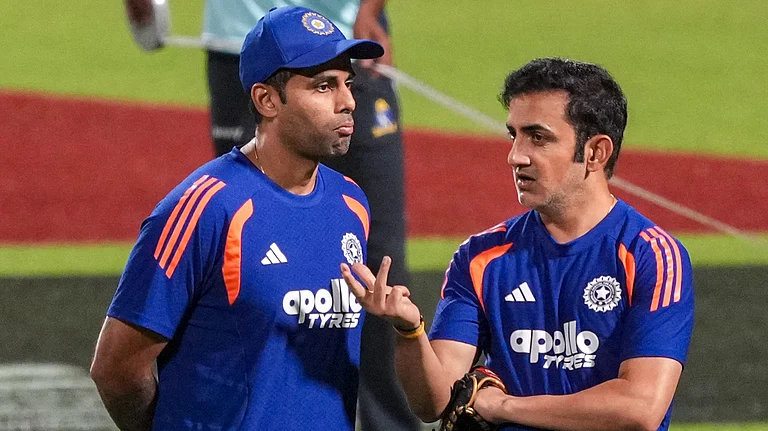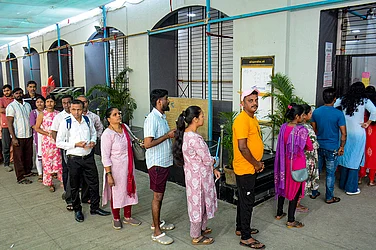The Supreme Court on Tuesday began the hearing of petitions in connection to the crucial debate on the legalisation of same-sex marriages in India. On the first day of hearing, senior advocate Maneka Guruswamy, taking a stand for the queer community, said that marriage is “not only a question of dignity but a bouquet of rights that LGBTQ people are being denied”. The Centre argued that the “legislative intent” of marriage in India has always been about the “relationship between a biological man and a biological female”.
Responding to this, the Supreme Court said that it will steer clear of personal laws and will only examine the provisions under the Special Marriage Act (SMA). The bench headed by Chief Justice DY Chandrachud also underlined that the very notion of a man and a woman, as referred to in the Special Marriage Act, is not "an absolute based on genitals".
In context of the ongoing hearing, we look into what are personal laws and how it is different from the Special Marriage Act.
What are personal laws and what is the Special Marriage Act?
Personal laws refer to a set of laws where an individual is governed in respect of matters relating to marriage, divorce, maintenance, adoption, inheritance, guardianship, succession, etc.
The Special Marriage Act of 1954, on the other hand, extends to the whole of India, barring only Jammu and Kashmir, and lets people register marriage even if they are of different religious faiths. It also stated that marriage celebrated under any other form can be registered under the Special Marriage Act if it satisfies the requirements mentioned under the law.
With regard to marriage, personal laws have been codified in different enactments applicable to people of different religions.
Here are some of the other key personal laws in India:
The Hindu Marriage Act, 1955
The Hindu Marriage Act was enacted to secure the rights of marriage for the Hindu bride and groom and it applies to any person who is a Hindu by religion, including a Virashaiva, a Lingayat or a follower of the Brahmo, Prarthana or Arya Samaj. It also applies to Buddhists, Sikhs and Jains.
Three other important acts were enacted as part of the Hindu Code Bills – the Hindu Succession Act (1956), the Hindu Minority and Guardianship Act (1956), the Hindu Adoptions and Maintenance Act (1956).
The Act does not extend to Christians, Muslims, Parsis or Jews.
The Indian Christian Marriage Act, 1872
The Christian Marriage Act consolidates and amends the law relating to the solemnization in India of the marriages of Christians.
Provisions under the Christian marriage law define the grounds for divorce. As per the Indian Christian Marriage Act, the husband can seek divorce on grounds of adultery on the part of his wife and the wife can seek divorce on the ground of conversion to another religion, as well as incestuous adultery, bigamy with adultery, marriage with another woman with adultery, rape, sodomy or bestiality.
Parsi Marriage and Divorce Act, 1936
This Act governs the matrimonial relations of Parsis or Parsi Zoroastrians, as defined in the Act. This marriage act has a racial significance. It also provides only for monogamy.
The law was amended in 2001 to bring the provisions in line with the Hindu Marriage Act. In case of a divorce, the amendment stated the provision for an application for alimony pendent lite or the maintenance and education of minor children, disposed of within 60 days from the date of service of notice on the wife or the husband, as the case may be.
Muslim marriage law in India
Unlike the Hindu Marriage Act, the Mohammedan law or Muslim law on marriage is not codified in India. However, the Parliament has passed various revisions and acts to deal with the challenges like consent, age, divorce, inheritance etc.
In 1939, the Dissolution of Muslim Marriage Act was enacted to provide a Muslim wife with the right to seek dissolution of her marriage on grounds such as imprisonment of her husband for seven or more years, unknown whereabouts for four years, non-maintenance for two years, failure to perform marital obligations, impotency, cruelty, leprosy or virulent venereal disease and if the marriage took place before the wife attained the age of 15 years and not consummated.
Apart from these, personal laws in India also include the Indian Divorce Act, 1869; Child Marriage Restraint Act, 1929; Foreign Marriage Act, 1969; The Kazis Act, 1880; The Indian Succession Act, 1925, and the Anand Marriage Act, 1909.


























